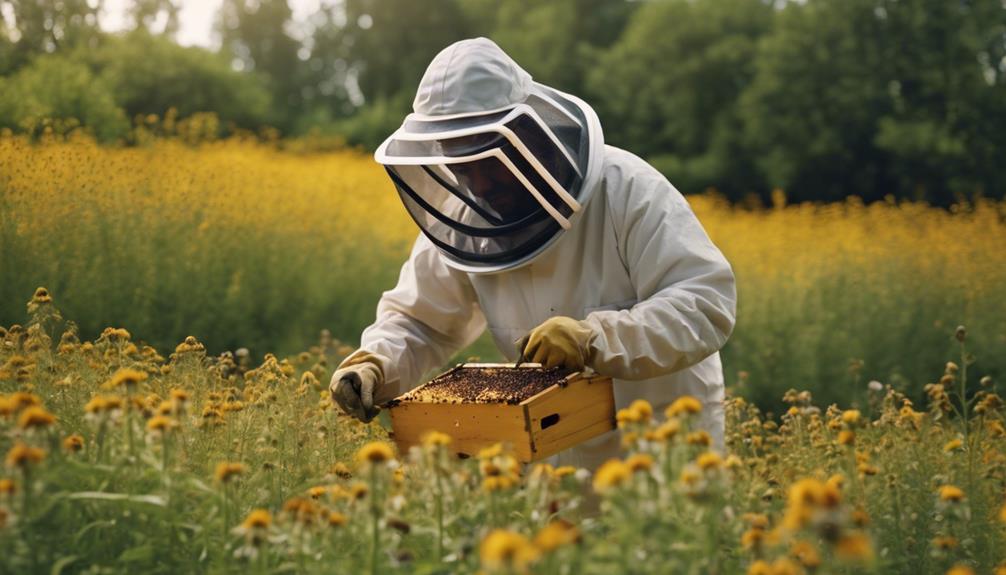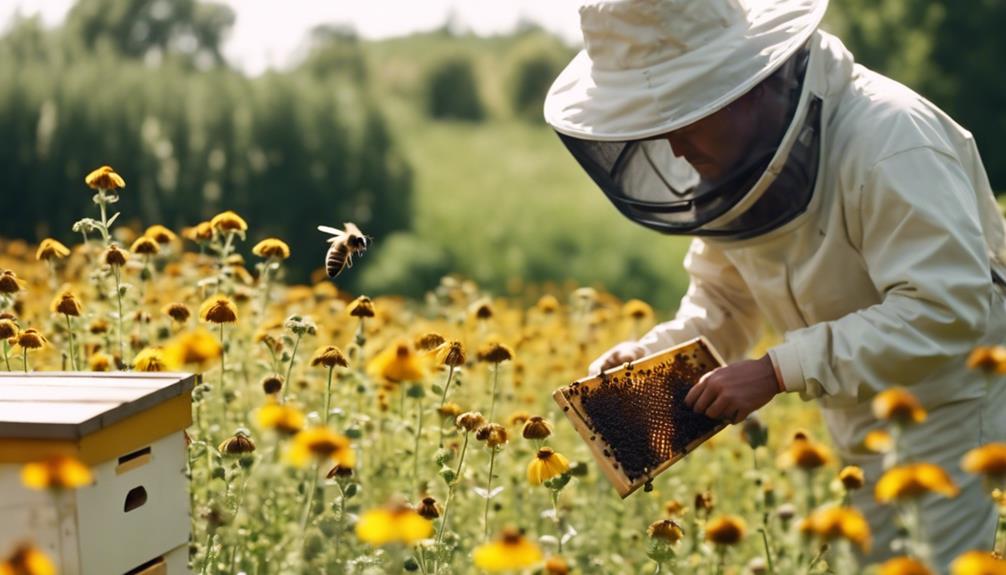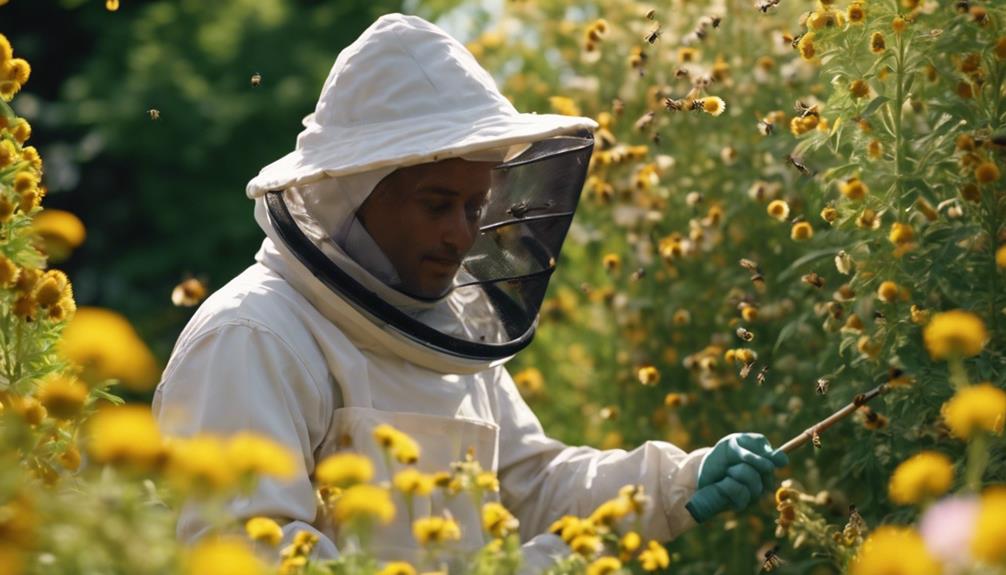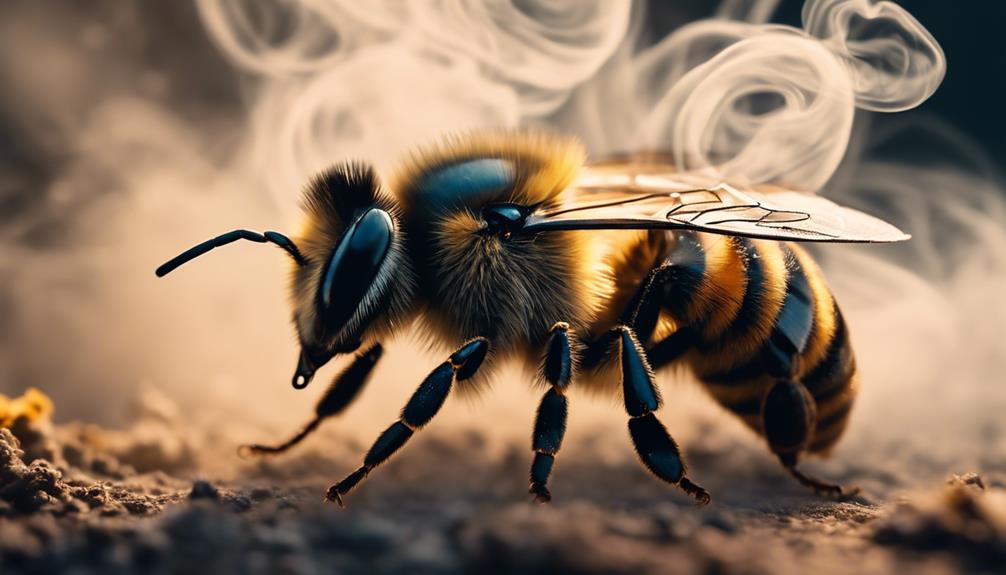In regards to honey, there’s definitely an ethical way to obtain it! By prioritizing bee welfare and environmental sustainability, selecting honey from local beekeepers with sustainable practices, and choosing certified organic or fair trade options, you can support ethical honey production. Avoiding large-scale operations and being conscious of bee welfare standards not only guarantees better quality honey but also helps safeguard bee populations and biodiversity. Remember, the choices we make as consumers impact the well-being of bees and the conservation efforts in place. So, why not discover more ways to support ethical honey production and bee welfare?
Main Points
- Choose honey from local, sustainable beekeepers.
- Prioritize certified organic and fair trade honey.
- Support small-scale ethical honey brands.
- Opt for bee-friendly practices and environmental sustainability.
- Promote bee welfare and biodiversity conservation.
Ethical Considerations in Honey Production
In ethical honey production, prioritizing bee welfare and environmental sustainability is crucial. Sustainable beekeeping practices not only benefit the bees but also support biodiversity and natural instincts.
When looking for ethical honey, consider options with organic certification and those involved in fair trade. These choices guarantee that the honey you consume is produced in a way that respects both the bees and the environment.
By avoiding honey from industrial-scale operations and unethical beekeeping practices, consumers can make a positive impact on bee health and conservation efforts. Remember, the decisions we make as consumers play a significant role in shaping the future of honey production.
Let’s choose wisely to support ethical practices that promote bee well-being and environmental sustainability.
Impact of Beekeeping Practices
As beekeepers, we must prioritize bee welfare standards to guarantee these essential pollinators thrive.
Conducting regular environmental impact assessments helps us understand the consequences of our beekeeping practices on the ecosystem.
Embracing sustainable honey production methods isn’t just a trend; it’s a necessity to safeguard the future of bees and our environment.
Bee Welfare Standards
Ensuring bee welfare standards are upheld in beekeeping practices is fundamental for promoting the health and well-being of bee populations. Balanced beekeeping involves guaranteeing bees have enough honey for winter survival without overharvesting, while natural beekeeping allows bees to follow their innate instincts without interference.
Biodynamic beekeeping focuses on reducing stress on bees and promoting sustainable practices. On the other hand, unethical practices can harm bee populations and jeopardize their survival. By adhering to bee welfare standards, we can support the vitality of bee colonies and contribute to a more sustainable future for these essential pollinators.
It’s essential to prioritize bee health and well-being in all beekeeping endeavors to ensure a harmonious relationship between humans and bees.
Environmental Impact Assessment
Evaluating the environmental impact of beekeeping practices is essential to comprehend the implications on bee populations and ecosystem health. When considering ethical honey choices, supporting local beekeepers who practice sustainable beekeeping methods is vital.
Here are some key points to keep in mind:
- Opt for UK-sourced honeys to reduce the carbon footprint associated with transportation.
- Choose honey from natural beekeepers who prioritize the well-being of bees and the environment.
- Look for honey produced by local beekeepers who follow organic beekeeping practices.
- Consider the long-term effects of honey consumption on bee populations and support sustainable beekeeping initiatives for a healthier ecosystem.
Sustainable Honey Production
Opting for honey sourced from local beekeepers who prioritize sustainable practices is essential for supporting ethical honey production. Sustainable honey production involves organic beekeeping methods that respect bee health and natural instincts.
Beekeepers who forage from chemical-free farms with diverse plant life support bee welfare and biodiversity. Managing hives by allowing bees to engage in their natural behaviors like swarming and queen production is vital for sustainable practices.
Using organic substances to treat hives for parasites helps maintain bee populations without resorting to harmful chemicals. Harvesting honey when hives are fullest in the fall guarantees bee survival through winter by providing enough food for their sustenance.
Prioritizing sustainable practices in hive management is key to promoting ethical practices and ensuring the well-being of bees in the long term.
Supporting Sustainable Beekeeping Methods
In terms of supporting sustainable beekeeping methods, it’s all about prioritizing bee welfare and preserving their habitats.
By opting for honey from small-scale beekeepers, we can contribute to maintaining balanced bee populations.
Choosing brands that practice ethical beekeeping, like Equal Exchange or Wainwrights, aligns with our goal of promoting sustainable practices.
Bee-Friendly Farming Practices
To support sustainable beekeeping methods, we prioritize promoting natural bee instincts and allowing bees to build their own honeycombs. Here are some bee-friendly farming practices that help uphold ethical standards and guarantee bee welfare:
- Encouraging swarming and queen production to maintain healthy bee populations.
- Allowing bees to construct their honeycombs naturally for their well-being.
- Choosing organic farms with diverse plant life for best bee foraging opportunities.
- Using organic treatments for hive parasites to safeguard bee health and vitality.
Protecting Bee Habitats
Supporting sustainable beekeeping methods not only safeguards bee habitats but also fosters biodiversity and environmental conservation. By prioritizing bee welfare and preserving natural bee behaviors, ethical beekeepers play an essential role in protecting bee habitats.
Choosing ethically sourced honey enables consumers to contribute to the well-being of bees and the maintenance of healthy ecosystems. Sustainable beekeeping practices aim to promote biodiversity, ensuring that bees thrive in their natural environments.
Through these efforts, we can help maintain the delicate balance of our ecosystems and support the vital role that bees play in pollination and food production. By advocating for sustainable beekeeping and ethically sourced honey, we actively participate in the conservation of bee habitats and the preservation of our environment.
Consumer Influence on Honey Production

Through our choices, we significantly shape ethical honey production by influencing beekeeping practices and supporting sustainable beekeepers. When we opt for honey from organic local farms and choose ethical honey brands, we embody our values of responsible sourcing and sustainable beekeeping practices.
Our mindful selection of honey not only satisfies our taste buds but also drives producers to adopt ethical practices in honey production. By supporting sustainable beekeepers, we make a positive impact on the environment and contribute to the well-being of bees.
Let’s continue to be conscious consumers, advocating for ethical honey production through our everyday choices.
Promoting Bee Well-being Through Purchases
Promoting bee well-being can be achieved through conscious choices in honey purchases that support ethical brands and sustainable beekeepers. By opting for honey from small-scale producers and known sources, we contribute to balanced bee-keeping practices.
Choosing ethical brands such as Equal Exchange and Tropical Forests not only guarantees high-quality honey but also supports bee conservation efforts. Subscribing to Ethical Consumer magazine not only enriches our knowledge but also aids bee conservation through donations to Friends of the Earth.
Understanding environmental and social criteria for ethical honey choices, like those provided in Ethical Consumer’s honey guide, empowers us to make informed decisions. Let’s bee mindful of our purchases, making a positive impact on bee well-being through sustainable practices and supporting ethical beekeepers.
Importance of Ethically Sourced Honey

Making conscious choices in honey purchases not only benefits bee well-being but also plays a significant role in supporting sustainable beekeeping practices. When we choose ethically sourced honey, we contribute to the well-being of bees and the environment.
Here are four reasons why ethically sourced honey is important:
- Supporting Local Beekeepers: Choosing honey from local beekeepers helps sustain bee populations in our area.
- Certified Organic Brands: Opting for certified organic honey supports ethical beekeeping standards and environmental conservation.
- Fair Trade Options: Selecting fair trade honey guarantees fair treatment for beekeepers and promotes sustainable practices.
- Small-Scale Ethical Brands: By avoiding industrial-scale production and supporting small-scale ethical brands, we help maintain balanced beekeeping practices.
Sustainable Practices for Honey Consumption
To consume honey sustainably, prioritize purchasing from beekeepers who practice natural and balanced hive management to guarantee bee welfare remains a top priority. Supporting small-scale producers not only benefits ethical beekeeping practices but also promotes sustainability in the honey industry.
Opting for local honey from known sources is another way to make sure that beekeeping practices are balanced and environmentally friendly. Choosing ethical honey brands like Equal Exchange or Tropical Forests can also ensure responsible production methods.

Hello! My name is Noel Calvin. I graduated from UCLA and now work as a writer at Launch Ninjas. I write blog posts that inspire and guide our readers in their entrepreneurial pursuits. I live in Pleasantville, NJ, with a peaceful yet lively atmosphere that inspires me.
Writing stories is more than just a job for me. It allows me to share my observations and satisfy my curiosity about the world. I combine my analytical skills with creative enthusiasm to delve into technology trends and startup stories. But my life isn’t limited to screens and keyboards. I value loyalty, passion, and a touch of old-fashioned charm, which I infuse into every narrative I create.
I love spending time in my garage, jamming with my band when I’m not writing. Playing the guitar and singing bring me immense joy. I also enjoy capturing ordinary and extraordinary moments through my camera lens and exploring new culinary adventures that excite my taste buds. I’m always seeking new experiences.
My family is very important to me. Joyful Sunday brunches filled with laughter and intense board game nights keep me grounded, reminding me of life’s simple pleasures.
In my world, every moment is an opportunity for discovery. Every discovery is a story worth sharing, whether a heartfelt moment at home or the pulse of technological innovations. Join me as I navigate through life, one blog post, one guitar strum, and one heartwarming family dinner at a time.


